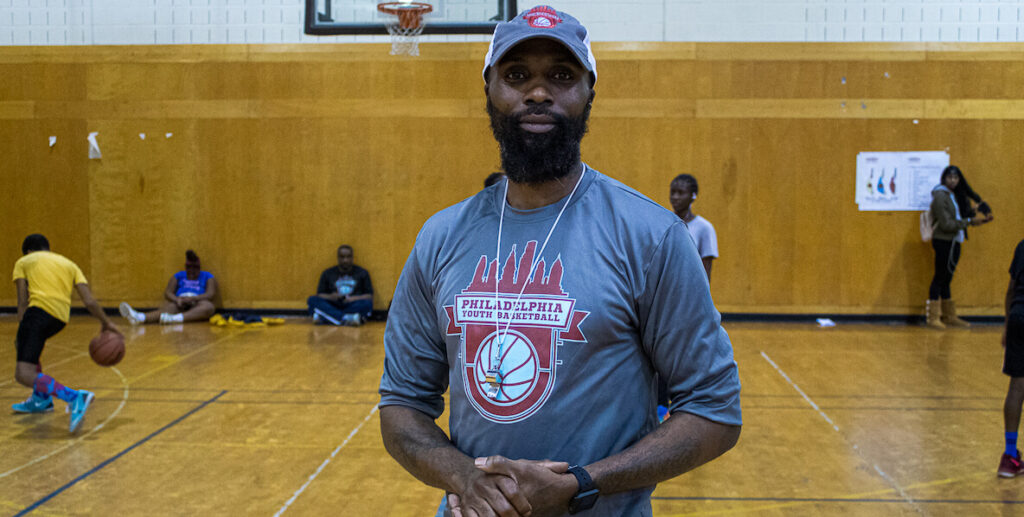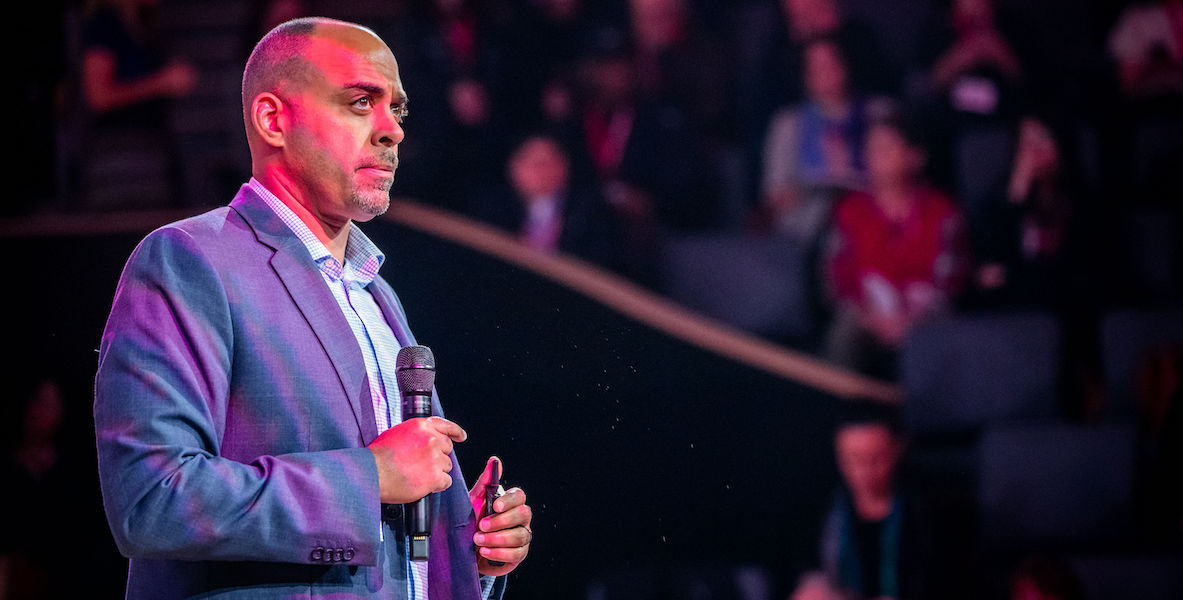[Editor’s note: After The Citizen’s Ideas We Should Steal Festival in December, we launched a request for proposals for this year’s $50,000 Jeremy Nowak Urban Innovation Award, named for our late chairman and funded by Spring Point Partners. The process was delayed because of Covid-19, but our committee of civic leaders, Nowak family members and The Philadelphia Citizen staff unanimously chose to award the prize to “I Am Because We Are,” a partnership between Philadelphia Youth Basketball and Taylor Paul’s RVA League for Safer Streets.]
I am a black man. I am a devoted father to a teenage daughter named Dasia. I am the son of the legendary Eric “Hank” Gathers, who died 30 years ago on a basketball court when I was 6 years old. This tragedy makes me a fatherless son and a fatherless father.
![]()
Presently though, I am in a much different place, on a considerably different path. Today, I am humbled and honored to accept the 2020 Jeremy Nowak Award for Urban Innovation on behalf of PYB. I do so at a time in our country’s history when institutional racism, especially in the criminal justice system, has been exposed in visible and horrific ways. I am on a purposeful quest of redemption. I am finding my voice, realizing my value, and gaining some positive visibility. I am a Philadelphia citizen. I am because we are.
As a result of a wrongful death suit that ensued after my father’s tragic heart failure, my immediate family and I were able to move from North Philadelphia to Cheltenham, where I grew up and attended Cheltenham High School. I was afforded many opportunities to flourish and succeed, and was even able to pursue my love for the game of basketball by playing on my high school’s varsity team. Shortly after graduating, I fell victim to idle time.
Traversing through my formative years without proper guidance or mentorship, coupled with the promise of financial stability once I turned 18, proved to be a recipe for disaster for me. I saw little value in pursuing a college education, as the financial cushion stripped me of drive and ambition. I began engaging in risky behavior that was not conducive to a productive lifestyle. I made some bad, life-altering decisions which ultimately lead to a five-year prison stay at Rockview Penitentiary, a state correctional institution.
Being locked up in prison was absolutely one of the lowest points in my life. My newborn daughter Dasia was only four months old when my prison sentence began. I was only just beginning to appreciate and embrace the beauty and responsibility of fatherhood when I lost my freedom. The hurt that I felt in my heart was unfathomable. Realizing that I would be unable to properly care for Dasia through the first five years of her life only compounded the emotional pain I was living with due to my own father’s absence.
The phrase comes from an African philosophy of the Ubuntu people, who believe one’s sense of self is shaped by one’s relationships with other people. It’s a way of living that begins with the premise that “I am” only because “we are”.
However, I somehow channeled those feelings of guilt, anger, embarrassment and frustration into a deep desire to become a better person and a better father. I committed myself to use the unfortunate time away from society for genuine self-reflection and introspection.
Upon returning home from prison in 2012, I needed to reconnect with my family, especially my daughter, and learn how to reenter society as a “returning citizen.” This reentry process has been experienced by far too many black men, many of whom fail to gain traction in the workforce, succumb to street life, and become part of the recidivism cycle.
They suffer and so do their families and community. I’d had no work experience outside of a retail job or two before my prison stay. Fortunately for me, I had a small circle of caring family and friends, a growing passion to work with young people, and enough humility to immerse in some meaningful volunteer experiences.
Through working with many PYB kids these past couple of years, mostly black boys and girls from high poverty neighborhoods, I was also able to build relationships with the people who are the epicenter of the organization—the coaches, mentors and operations staff. Sixteen of us, all people of color, are immersed in PYB’s six month Leadership Development Academy which is led by Umi Howard of Wharton’s McNulty Leadership Program.
The first time I walked into Huntsman Hall on Penn’s campus, it dawned on me that people who have accumulated more prison years than college credits are rarely afforded the opportunity to learn in one of the most prestigious educational institutions in the world. But, I knew that PYB was investing in my development as a leader and therefore, I was not some kind of imposter. I actually belonged.
Late in 2019, after the Philadelphia Citizen’s Ideas We Should Steal Festival, Kenny shared with our staff team the work of Taylor Paul, Jawad Abdu, and Prince Bunn, men who had spent two decades in prison before creating the RVA League for Safer Streets in Richmond, Virginia.
The RVA League was becoming highly successful for lowering the rates of youth violence in Richmond by using a combination of basketball and life skills, including conflict resolution. We in Philadelphia got busy working with Taylor and Prince to build a program model similar to RVA. We added our unique PYB flavoring—rigorous academic modules focused on sport and social justice issues, healthy meals prepared by our chef Raheem Islam Jr., and the careful creation of a community that pushes, supports, and holds one another accountable.
Of course, the prominence of basketball, life skills, culturally relatable coaches and mentors and the establishment of a positive code of conduct were adapted to our approach. This model became the basis of our “I Am Because We Are” proposal for the prestigious Jeremy Nowak Urban Innovation Award.
The phrase comes from an African philosophy of the Ubuntu people, who believe one’s sense of self is shaped by one’s relationships with other people. It’s a way of living that begins with the premise that “I am” only because “we are”.
My PYB colleague Nahijee Cross, age 21, took the lead in preparing and submitting our materials to The Philadelphia Citizen. When we were notified that we would have the opportunity to present ourselves, our team sprung into action. Kenny suggested that Taylor, Prince, and I lead the presentation while he play a more limited role because, as he put it, our “lived experience” was of great value.
Coach K, as Taylor calls him, seemed confident in our ability to carry the load. In our first live prep session on Zoom, I could not find my footing. I struggled to articulate the contours of the program, and worse yet, I could not comfortably state the “why” of our program plans and tie it to my own personal journey.
Taylor and Prince, however, were poised and compelling. They knew exactly what to say and how to express themselves. I was in awe of these older guys who had overcome so much. And, like Kenny, they believed in me.
Black boys and men must start lifting one another up, the same as white people must become actively anti-racist. We are in this struggle together.
Two days later was game time. I was sleepless the night before. I had never presented to a distinguished panel of eight professionals alongside some great colleagues whom I did not want to disappoint. I gave myself a pep talk, practiced into the wee hours of the morning, put on a shirt and tie, and moments after we logged into the Zoom chat from our respective homes, it was my turn to speak.
A welcomed and unexpected calm came over me and away I went. For me, it was the first time in a high stakes setting that I was not only sharing my story, but genuinely owning it. I listened to myself speak and I was at peace. My missteps were and continue to be a part of who I am. They will always be and I can live with that, because I am committed to a completely different trajectory for my life.
But for me, the murder of George Floyd told a larger story. Like many, I saw the oxygen literally taken out of a man as he gasped for his last breath by an armed Minneapolis police officer while three other officers stood by and watched. George Floyd was the symbol of a black man whose life was devalued in the most blatant of ways. He was powerless and seemingly expendable.
As I write this testimonial, thousands of people are protesting peacefully in the streets in Philadelphia and in cities across the country and world. It is heartening to see so many people across races, ethnicities, religions, and ages standing in solidarity and expressing a shared rage that racism in all of its ugly forms must be ended. I am there in spirit and will find many other ways to constructively speak out.
One way is through my leadership in our soon to be launched “I Am Because We Are” program. These teenagers must be guided in positive ways, by a deeply supportive community, with leaders like me who are prepared to show them that they are of value and worth investing in. I know they are and I will do everything in my power to lift them up. Black boys and men must start lifting one another up, the same as white people must become actively anti-racist. We are in this struggle together.
Aaron Crump is a coach-mentor for Philadelphia Youth Basketball.


